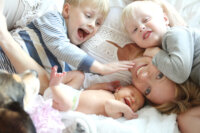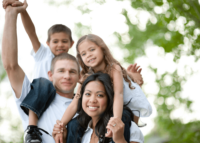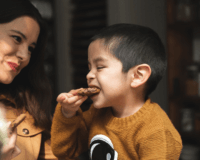Living out God’s original plan for family

I believe with all my heart that the first, best community God created was the family.
During creation, on day six he built his masterpiece: humans. Right from the start God determined that it was never good for a person to be alone, so God put forth his solution: ready-made community, for you and for me.
From that moment onward, whenever life felt hard or scary or frustrating, we’d have people to come home to, someone to lean on, shoulders on which to bury our tearstained faces. A friend.
Our family would be there for us, and we would be there for them. This would not be a come-and-go arrangement but rather a covenant commitment.
Our first community
We would stick together through every season, seeing, knowing, loving, serving. We would practice relating within the four walls of our home so that when we went out into the world, we would know how to love others well.
We would know how to ask good questions because we practiced good question-asking at home. We would know how to show empathy to hurting people because we practiced empathetic communication at home. We would know how to live unoffended because we practiced letting go of our hurts at home.
We would know how to extend earnest forgiveness because we practiced forgiving others at home. We would know how to work through differences and disagreements because we practiced effective conflict resolution at home.
Family was supposed to be our first community, a gathering of people who accepted and loved us and then taught us to accept and love others well. This was God’s original plan, both to bless people within families and then to bless through families the rest of the world.
Outright freedom in family
“God places the lonely in families,” the psalmist promised; “he sets the prisoners free and gives them joy” (Psalm 68:6 NLT). I’ve always loved that verse because of the comparison between family members and prisoners who have been freed. The picture of the family ought to be a picture of outright freedom, of chains being thrown off, of joy. Which is why historically it was not considered a big deal to set aside our own desires and care for those in our family.
I’m thinking here of exhortations such as the one in 1 Timothy, where the apostle Paul reminded his young protégé that family matters: “Those who won’t care for their relatives, especially those in their own household, have denied the true faith. Such people are worse than unbelievers” (1 Tim. 5:8).
Pretty harsh language, right? So harsh that it nearly reads as hyperbole, as in, “Of course we care for the members of our family, Timothy. I mean, this is so obvious that I probably don’t even need to say it.”
The “relatives” part to those living in Paul’s day would include not only those in your immediate family, but also extended family members and even the stranger who was passing by and needed a place to stay, food to eat, or short-term care of some other kind.
Some historians suggest that this gathering of related people could have numbered up to one hundred, a far cry from the 2.63 people in the modern family of today. Your household included all those you were responsible for. Those you willingly cared for. Those with whom you’d rise or fall.
You’d share meals with these people.
You’d raise children with these people.
You’d labor with these people.
You’d entertain dreams with these people.
You’d swap stories with these people.
You’d work through disagreements with these people.
You’d celebrate wins with these people.
You’d grieve disappointments with these people.
You’d bury loved ones with these people.
You’d do all the stuff of life with these people. And you’d do this every day.
Family is hard
All this togetherness built into God’s plan for family probably begs a question: What if these people we call family consistently drive us absolutely crazy?! Or far worse—they are completely absent or abusive?
I know. I hear your stories of unthinkable atrocities committed by family members. First, hear me clearly: toxic abuse absolutely requires boundaries and perhaps estrangement. Please seek help if you are in that position now or if you experienced it growing up and have never healed from it.
No one should go through that alone. But for most of us, our family members aren’t truly toxic. They just drive us crazy! Or maybe we just don’t like some of them. Maybe they are critical of how you parent or what you want to do after college. Maybe they manipulate you with money or correct your grammar or complain constantly that you never come to visit.
With family you don’t get to pick your people. Which means that most likely they won’t all be easy to love.
I was thirty years old when I sat down with my dad to tell him how I lived with a limp from the hurts he had inadvertently brought into my life. At the time I was a young parent myself but still didn’t realize how easy it is to wound your kids.
I wrote my dad a six-page letter, three pages of gratitude and three pages of wounds, and read it aloud. It felt important. I had done the work, including years of counseling, but I had never shared with him the hurt that some of his behaviors had caused me.
Here’s the beautiful truth about my earthly daddy: he loves Jesus, he loves his family, and he has spent his entire life trying to be a good father and a loving husband. As his daughter, I have so much to be thankful for. And yet I still walked away from my upbringing with baggage, hurt, and a bit of a spiraling identity crisis.
The cycle of love and hurt
We all carry attachment issues into adulthood because we all have sinners for parents. My dad listened to every word I said that day. He cried happy tears over my gratitude for tuck-ins and for his working tirelessly to provide for us.
He cried bitter ones when I carefully explained how I’d often feared that I was never enough in his estimation. And then he did something I couldn’t have imagined prior to this conversation: he told me about his relationship with his mom and his dad. In short, he said, “Jennie, I messed up. It was my fault, not yours. And let me tell you where I first heard the message that I had to be perfect: it was from my mom and dad. I heard that message, I absorbed that message, and then I passed that message on to you.”
We love others in the manner in which we ourselves were loved. Equally true—we tend to hurt others in the manner in which we ourselves have been hurt. The cycle perpetuates itself until something interrupts it and someone says, “Enough.”
That’s what Dad and I did that day. In unison, we said, “Enough.”
Adapted from FIND YOUR PEOPLE: Building Deep Community in a Lonely World © 2022 by Jennie Allen. Published by WaterBrook, an imprint of Random House, a division of Penguin Random House LLC, on February 22, 2022.
Consider a few extra resources:







